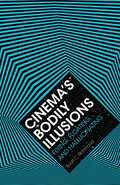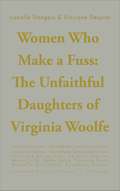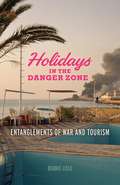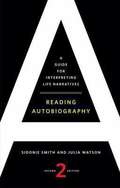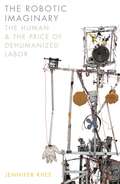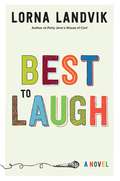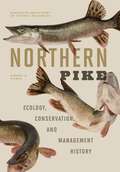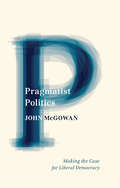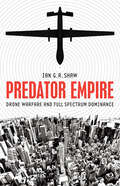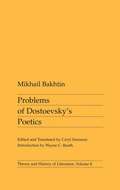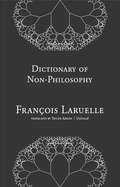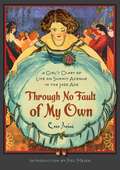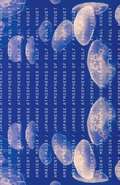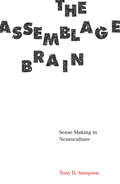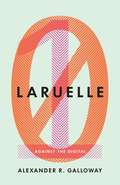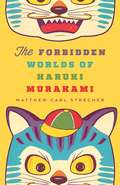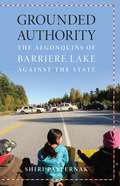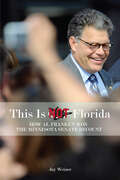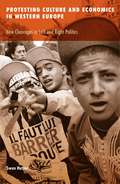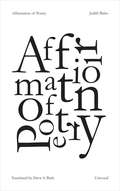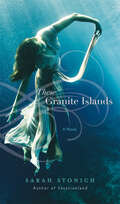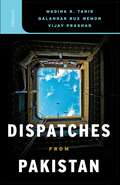- Table View
- List View
Cinema's Bodily Illusions: Flying, Floating, and Hallucinating
by Scott C. RichmondDo contemporary big-budget blockbuster films like Gravity move something in us that is fundamentally the same as what avant-garde and experimental films have done for more than a century? In a powerful challenge to mainstream film theory, Cinema&’s Bodily Illusions demonstrates that this is the case. Scott C. Richmond bridges genres and periods by focusing, most palpably, on cinema&’s power to evoke illusions: feeling like you&’re flying through space, experiencing 3D without glasses, or even hallucinating. He argues that cinema is, first and foremost, a technology to modulate perception. He presents a theory of cinema as a proprioceptive technology: cinema becomes art by modulating viewers&’ embodied sense of space. It works primarily not at the level of the intellect but at the level of the body. Richmond develops his theory through examples of direct perceptual illusion in cinema: hallucinatory flicker phenomena in Tony Conrad&’s The Flicker, eerie depth effects in Marcel Duchamp&’s Anémic Cinéma, the illusion of bodily movement through onscreen space in Stanley Kubrick&’s 2001, Godfrey Reggio&’s Koyaanisqatsi, and Alfonso Cuarón&’s Gravity. In doing so he combines insights from Maurice Merleau-Ponty&’s phenomenology of perception and James J. Gibson&’s ecological approach to perception. The result is his distinctive ecological phenomenology, which allows us to refocus on the cinema&’s perceptual, rather than representational, power.Arguing against modernist habits of mind in film theory and aesthetics, and the attendant proclamations of cinema&’s death or irrelevance, Richmond demonstrates that cinema&’s proprioceptive aesthetics make it an urgent site of contemporary inquiry.
Fritz Lang: The Nature of the Beast
by Patrick McGilliganThe name of Fritz Lang—the visionary director of Metropolis, M, Fury, The Big Heat, and thirty other unforgettable films—is hallowed the world over. But what lurks behind his greatest legends and his genius as a filmmaker? Patrick McGilligan, placed among &“the front rank of film biographers&” by the Washington Post, spent four years in Europe and America interviewing Lang&’s dying contemporaries, researching government and film archives, and investigating the intriguing life story of Fritz Lang. This critically acclaimed biography—lauded as one of the year&’s best nonfiction books by Publishers Weekly—reconstructs the compelling, flawed human being behind the monster with the monocle.
Women Who Make a Fuss: The Unfaithful Daughters of Virginia Woolf (Univocal)
by Isabelle Stengers Vinciane DespretVirginia Woolf, to whom university admittance had been forbidden, watched the universities open their doors. Though she was happy that her sisters could study in university libraries, she cautioned women against joining the procession of educated men and being co-opted into protecting a &“civilization&” with values alien to women. Now, as Woolf&’s disloyal (unfaithful) daughters, who have professional positions in Belgian universities, Isabelle Stengers and Vinciane Despret, along with a collective of women scholars in Belgium and France, question their academic careers and reexamine the place of women and their role in thinking, both inside and outside the university. They urge women to heed Woolf&’s cry—Think We Must—and to always make a fuss about injustice, cruelty, and arrogance.
Holidays in the Danger Zone: Entanglements of War and Tourism (Critical War Studies)
by Debbie LisleHolidays in the Danger Zone exposes the mundane and everyday interactions between two seemingly opposed worlds: warfare and tourism. Debbie Lisle shows how a tourist sensibility shapes the behavior of soldiers in war—especially the experiences of Western military forces in &“exotic&” settings. This includes not only R&R but also how battlefields become landscapes of leisure and tourism. She further explores how a military sensibility shapes the development of tourism in the postwar context, from &“Dark Tourism&” (engaging with displays of conflict and atrocity) to exhibitions of conflict in museums and at memorial sites, as well as advertising, film, journals, guidebooks, blogs, and photography. Focused on how war and tourism reinforce prevailing modes of domination, Holidays in the Danger Zone critically examines the long historical arc of the war–tourism nexus—from nineteenth-century imperialism to World War I and World War II, from the Cold War to globalization and the War on Terror.
Reading Autobiography: A Guide for Interpreting Life Narratives, Second Edition
by Sidonie Smith Julia WatsonWith the memoir boom, life storytelling has become ubiquitous and emerged as a distinct field of study. Reading Autobiography, originally published in 2001, was the first comprehensive critical introduction to life writing in all its forms. Widely adopted for undergraduate and graduate-level courses, it is an essential guide for students and scholars reading and interpreting autobiographical texts and methods across the humanities, social sciences, and visual and performing arts. Thoroughly updated, the second edition of Reading Autobiography is the most complete assessment of life narrative in its myriad forms. It lays out a sophisticated, theoretical approach to life writing and the components of autobiographical acts, including memory, experience, identity, embodiment, space, and agency. Sidonie Smith and Julia Watson explore these components, review the history of life writing and the foundations of autobiographical subjectivity, and provide a toolkit for working with twenty-three key concepts. Their survey of innovative forms of life writing, such as autographics and installation self-portraiture, charts recent shifts in autobiographical practice. Especially useful for courses are the appendices: a glossary covering dozens of distinct genres of life writing, proposals for group and classroom projects, and an extensive bibliography.
The Robotic Imaginary: The Human and the Price of Dehumanized Labor
by Jennifer RheeTracing the connections between human-like robots and AI at the site of dehumanization and exploited labor The word robot—introduced in Karel Čapek&’s 1920 play R.U.R.—derives from rabota, the Czech word for servitude or forced labor. A century later, the play&’s dystopian themes of dehumanization and exploited labor are being played out in factories, workplaces, and battlefields. In The Robotic Imaginary, Jennifer Rhee traces the provocative and productive connections of contemporary robots in technology, film, art, and literature. Centered around the twinned processes of anthropomorphization and dehumanization, she analyzes the coevolution of cultural and technological robots and artificial intelligence, arguing that it is through the conceptualization of the human and, more important, the dehumanized that these multiple spheres affect and transform each other.Drawing on the writings of Alan Turing, Sara Ahmed, and Arlie Russell Hochschild; such films and novels as Her and The Stepford Wives; technologies like Kismet (the pioneering &“emotional robot&”); and contemporary drone art, this book explores anthropomorphic paradigms in robot design and imagery in ways that often challenge the very grounds on which those paradigms operate in robotics labs and industry. From disembodied, conversational AI and its entanglement with care labor; embodied mobile robots as they intersect with domestic labor; emotional robots impacting affective labor; and armed military drones and artistic responses to drone warfare, The Robotic Imaginary ultimately reveals how the human is made knowable through the design of and discourse on humanoid robots that are, paradoxically, dehumanized.
Best to Laugh: A Novel
by Lorna LandvikNo one steps up to life&’s banquet, holds out her tray, and orders, &“Grief, please!&” But as a child, Candy Pekkala was served a heaping helping of it. Every buffet line has a dessert section, however, and when a cousin calls with a Hollywood apartment to sublet, it seems as though Candy is finally offered something sweet. It&’s good-bye to Minnesota and hello to California, where a girl who has always lived by her wits has a real chance of making a living with them. With that, the irrepressible Lorna Landvik launches her latest irresistible character onto the world stage—or at least onto the dimly lit small stage where stand-up comedy gets its start.Herself a comic performer, Landvik taps her own adventurous past and Minnesota roots to conjure Candy&’s life in this strange new Technicolor home. Her fellow tenants at Peyton Hall include a female bodybuilder, a ruined nightclub impresario, and a well-connected Romanian fortune-teller. There are game show appearances and temp jobs at a record company and an establishment suspiciously like the Playboy Mansion, and of course the alluring but not always welcoming stage of stand-up comedy. As she hones her act, Candy is tested by humiliation, hecklers, and the inherent sexism that insists &“chicks aren&’t funny.&”Written with the light touch and quiet wisdom that have made her works so popular, this is classic Lorna Landvik—sometimes so funny, you&’ll cry; sometimes so sad, you might as well laugh; and always impossible to put down.
Northern Pike: Ecology, Conservation, and Management History
by Rodney B. PierceThe northern pike—sometimes affectionately known as the &“aquatic wolf&”—is one of the most sought after and mythologized fishes in Minnesota, but until now there have been few books devoted to the history and ecological management of the species. Based on pioneering research carried out in Minnesota by leading pike specialist Rodney B. Pierce, Northern Pike Ecology, Conservation, and Management History is the most complete collection of information to date on the species, for everyone from scientists and conservation biologists to general readers and recreational anglers.A tremendously important game fish and resource both in Minnesota and throughout the northern hemisphere, northern pike populations directly reflect local geology and human influence, playing a key role in the health of freshwater ecosystems. As urbanization spreads and the human population continues to grow, pike populations face increasing pressure, requiring new ways of looking at and managing the species. In Minnesota, groundbreaking work has been conducted on northern pike: analyses of stocking success and investigations into the relationships within fish communities, the management of rearing marshes, environmental effects on natural production, the genetics of northern pike, and strategies for scientifically monitoring pike. The state has been a leader in developing fishing regulations to help restore large pike, among many other measures designed to ensure the future quantity and health of a key species in Minnesota&’s waterways.Weaving significant historical scientific literature and technical details together with his own research, Pierce&’s benchmark study documents and synthesizes the long history of northern pike management and describes the latest efforts being taken to better understand and manage this critical and renowned species.
Pragmatist Politics: Making the Case for Liberal Democracy
by John McGowanIn our current age of cynicism, John McGowan suggests that the time is right to take a fresh look at pragmatism, the philosophy of American democracy. As McGowan shows, pragmatism can be an inspiring alternative to the despair that seems to dominate contemporary American politics. Pragmatist Politics is passionate and convincing, both heartfelt and clear-eyed. It offers an expansive vision of what the United States could be and should be.From John Dewey and William James, McGowan derives a history of democracy as a way of life, characterized by a distinctive ethos and based on an understanding of politics as potentially effective collective agency. That democratic ideal is wedded to a liberalism that focuses on extending the benefits of democracy and of material prosperity to all. Beyond the intellectual case for liberal democracy, McGowan turns to how James, especially, was attuned to the ways that emotional appeals often trump persuasion through arguments, and he examines the work of Kenneth Burke, among others, to investigate the link between liberal democracy and a comic view of human life. Comedy, McGowan notes, allows consideration of themes of love, forgiveness, and generosity that figure far too infrequently in philosophical accounts of politics.In McGowan&’s work, the combination of pragmatism and comedy takes us on a wide-ranging exploration of what American politics—and by extension American life—could actually be like if it truly reflected American values.
Predator Empire: Drone Warfare and Full Spectrum Dominance
by Ian G. ShawWhat does it mean for human beings to exist in an era of dronified state violence? How can we understand the rise of robotic systems of power and domination? Focusing on U.S. drone warfare and its broader implications as no other book has to date, Predator Empire argues that we are witnessing a transition from a labor-intensive &“American empire&” to a machine-intensive &“Predator Empire.&” Moving from the Vietnam War to the War on Terror and beyond, Ian G. R. Shaw reveals how changes in military strategy, domestic policing, and state surveillance have come together to enclose our planet in a robotic system of control. The rise of drones presents a series of &“existential crises,&” he suggests, that are reengineering not only spaces of violence but also the character of the modern state. Positioning drone warfare as part of a much longer project to watch and enclose the human species, he shows that for decades—centuries even—human existence has slowly but surely been brought within the artificial worlds of &“technological civilization.&” Instead of incarcerating us in prisons or colonizing territory directly, the Predator Empire locks us inside a worldwide system of electromagnetic enclosure—in which democratic ideals give way to a system of totalitarian control, a machinic &“rule by Nobody.&” As accessibly written as it is theoretically ambitious, Predator Empire provides up-to-date information about U.S. drone warfare, as well as an in-depth history of the rise of drones.
Problems of Dostoevsky's Poetics (Theory and History of Literature #8)
by Mikhail BakhtinThis book is not only a major twentieth-century contribution to Dostoevsky&’s studies, but also one of the most important theories of the novel produced in our century. As a modern reinterpretation of poetics, it bears comparison with Aristotle.
Dictionary of Non-Philosophy (Univocal)
by François LaruelleIn The Dictionary of Non-Philosophy, the French thinker François Laruelle does something unprecedented for philosophers: he provides an enormous dictionary with a theoretical introduction, carefully crafting his thoughts to explain the numerous terms and neologisms that he deems necessary for the project of non-philosophy. With a collective of thinkers also interested in the project, Laruelle has taken up the difficult task of creating an essential guide for entering into his non-standard, non-philosophical terrain. And for Laruelle, even the idea of a dictionary and what a dictionary is become material for his non-philosophical inquiries. As his opening note begins, &“Thus on the surface and within the philosophical folds of the dictionary, identity and its effect upon meaning are what is at stake.&”
Through No Fault of My Own: A Girl’s Diary of Life on Summit Avenue in the Jazz Age (A Fesler-Lampert Minnesota Heritage Book)
by Coco IrvineOn Christmas Day, 1926, twelve-year-old Clotilde &“Coco&” Irvine received a blank diary as a present. Coco loved to write—and to get into scrapes—and her new diary gave her the opportunity to explain her side of the messes she created: &“I&’m in deep trouble through no fault of my own,&” her entries frequently began. The daughter of a lumber baron, Coco grew up in a twenty-room mansion on fashionable Summit Avenue at the peak of the Jazz Age, a time when music, art, and women&’s social status were all in a state of flux and the economy was still flying high. Coco&’s diary carefully records her adventures, problems, and romances, written with a lively wit and a droll sense of humor. Whether sneaking out to a dance hall in her mother&’s clothes or getting in trouble for telling an off-color joke, Coco and her escapades will captivate and delight preteen readers as well as their mothers and grandmothers. Peg Meier&’s introduction describes St. Paul life in the 1920s and provides context for the privileged world that Coco inhabits, while an afterword tells what happens to Coco as an adult—and reveals surprises about some of the other characters in the diary.
Ambient Media: Japanese Atmospheres of Self
by Paul RoquetAmbient Media examines music, video art, film, and literature as tools of atmospheric design in contemporary Japan, and what it means to use media as a resource for personal mood regulation. Paul Roquet traces the emergence of ambient styles from the environmental music and Erik Satie boom of the 1960s and 1970s to the more recent therapeutic emphasis on healing and relaxation.Focusing on how an atmosphere works to reshape those dwelling within it, Roquet shows how ambient aesthetics can provide affordances for reflective drift, rhythmic attunement, embodied security, and urban coexistence. Musicians, video artists, filmmakers, and novelists in Japan have expanded on Brian Eno&’s notion of the ambient as a style generating &“calm, and a space to think,&” exploring what it means to cultivate an ambivalent tranquility set against the uncertain horizons of an ever-shifting social landscape. Offering a new way of understanding the emphasis on &“reading the air&” in Japanese culture, Ambient Media documents both the adaptive and the alarming sides of the increasing deployment of mediated moods.Arguing against critiques of mood regulation that see it primarily as a form of social pacification, Roquet makes a case for understanding ambient media as a neoliberal response to older modes of collective attunement—one that enables the indirect shaping of social behavior while also allowing individuals to feel like they are the ones ultimately in control.
The Assemblage Brain: Sense Making in Neuroculture
by Tony D. SampsonOnce upon a time, neuroscience was born. A dazzling array of neurotechnologies emerged that, according to popular belief, have finally begun to unlock the secrets of the brain. But as the brain sciences now extend into all corners of cultural, social, political, and economic life, a yet newer world has taken shape: &“neuroculture,&” which goes further than ever before to tackle the profound ethical implications we face in consequence.The Assemblage Brain unveils a major new concept of sense making, one that challenges conventional scientific and philosophical understandings of the brain. Drawing on Deleuze and Guattari, Tony D. Sampson calls for a radical critical theory that operates in the interferences between philosophy, science, art, and politics. From this novel perspective the book is structured around two questions: &“What can be done to a brain?&” and &“What can a brain do?&” Sampson examines the rise of neuroeconomics in informing significant developments in computer work, marketing, and the neuropharmaceutical control of inattentiveness in the classroom. Moving beyond the neurocapitalist framework, he then reestablishes a place for proto-subjectivity in which biological and cultural distinctions are reintegrated in an understanding of the brain as an assemblage. The Assemblage Brain unravels the conventional image of thought that underpins many scientific and philosophical accounts of how sense is produced, providing a new view of our current time in which capitalism and the neurosciences endeavor to colonize the brain.
Laruelle: Against the Digital (Posthumanities #31)
by Alexander R. GallowayLaruelle is one of the first books in English to undertake in an extended critical survey of the work of the idiosyncratic French thinker François Laruelle, the promulgator of non-standard philosophy. Laruelle, who was born in 1937, has recently gained widespread recognition, and Alexander R. Galloway suggests that readers may benefit from colliding Laruelle&’s concept of the One with its binary counterpart, the Zero, to explore more fully the relationship between philosophy and the digital. In Laruelle, Galloway argues that the digital is a philosophical concept and not simply a technical one, employing a detailed analysis of Laruelle to build this case while referencing other thinkers in the French and Continental traditions, including Alain Badiou, Gilles Deleuze, Martin Heidegger, and Immanuel Kant. In order to explain clearly Laruelle&’s concepts such as the philosophical decision and the principle of sufficient philosophy, Galloway lays a broad foundation with his discussions of &“the One&” as it has developed in continental philosophy, the standard model of philosophy, and how philosophers view &“the digital.&”Digital machines dominate today&’s world, while so-called digital thinking—that is, binary thinking such as presence and absence or self and world—is often synonymous with what it means to think at all. In examining Laruelle and digitality together, Galloway shows how Laruelle remains a profoundly non-digital thinker—perhaps the only non-digital thinker today—and engages in an extensive discussion on the interconnections between media, philosophy, and technology.
The Forbidden Worlds of Haruki Murakami
by Matthew Carl StrecherIn an &“other world&” composed of language—it could be a fathomless Martian well, a labyrinthine hotel or forest—a narrative unfolds, and with it the experiences, memories, and dreams that constitute reality for Haruki Murakami&’s characters and readers alike. Memories and dreams in turn conjure their magical counterparts—people without names or pasts, fantastic animals, half-animals, and talking machines that traverse the dark psychic underworld of this writer&’s extraordinary fiction.Fervently acclaimed worldwide, Murakami&’s wildly imaginative work in many ways remains a mystery, its worlds within worlds uncharted territory. Finally in this book readers will find a map to the strange realm that grounds virtually every aspect of Murakami&’s writing. A journey through the enigmatic and baffling innermost mind, a metaphysical dimension where Murakami&’s most bizarre scenes and characters lurk, The Forbidden Worlds of Haruki Murakami exposes the psychological and mythological underpinnings of this other world. Matthew Carl Strecher shows how these considerations color Murakami&’s depictions of the individual and collective soul, which constantly shift between the tangible and intangible but in this literary landscape are undeniably real. Through these otherworldly depths The Forbidden Worlds of Haruki Murakami also charts the writer&’s vivid &“inner world,&” whether unconscious or underworld (what some Japanese critics call achiragawa, or &“over there&”), and its connectivity to language. Strecher covers all of Murakami&’s work—including his efforts as a literary journalist—and concludes with the first full-length close reading of the writer&’s newest novel, Colorless Tsukuru Tazaki and His Years of Pilgrimage.
Debating the End of History: The Marketplace, Utopia, and the Fragmentation of Intellectual Life (Critical American Studies)
by David W. NobleWhy do modern people assume that there will be perpetual economic growth? Because, David W. Noble tells us in this provocative study of cultural criticism, such a utopian conviction is the necessary foundation for bourgeois culture. One can imagine the existence of modern middle classes only as long as the capitalist marketplace is expanding. For Noble, the related—and relevant—question is, how can the middle classes believe that a finite earth is an environment in which infinite growth is possible? The answer, which Noble so painstakingly charts, is nothing less than a genealogy of the uses and abuses of knowledge that lie at the heart of so many of our political problems today.As far back as Plato and as recently as Alan Greenspan, Noble finds proponents of the idea of a world of independent, rational individuals living in timeless simplicity, escaping from an old world of interdependence and generations. Such notions, although in sync with Newtonian science, have come up against the subsequent conclusions of geology, biology, and the physics of Einstein. In a survey of the responses to this quandary of historians, economists, literary critics, and ecologists, Noble reveals how this confrontation, and its implications for a single global marketplace, has forced certain academic disciplines into unnatural—and untenable—positions.David Noble&’s work exposes the cost—not academic at all—of the segregation of the physical sciences from the humanities and social sciences, even as it demonstrates the required movement of the humanities toward the ecological vision of a single, interconnected world.
Grounded Authority: The Algonquins of Barriere Lake against the State (Indigenous Americas)
by Shiri PasternakWestern Political Science Association's Clay Morgan Award for Best Book in Environmental Political Theory Canadian Studies Network Prize for the Best Book in Canadian Studies Nominated for Best First Book Award at NAISA Honorable Mention: Association for Political and Legal Anthropology Book Prize Since Justin Trudeau&’s election in 2015, Canada has been hailed internationally as embarking on a truly progressive, post-postcolonial era—including an improved relationship between the state and its Indigenous peoples. Shiri Pasternak corrects this misconception, showing that colonialism is very much alive in Canada. From the perspective of Indigenous law and jurisdiction, she tells the story of the Algonquins of Barriere Lake, in western Quebec, and their tireless resistance to federal land claims policy. Grounded Authority chronicles the band&’s ongoing attempts to restore full governance over its lands and natural resources through an agreement signed by settler governments almost three decades ago—an agreement the state refuses to fully implement. Pasternak argues that the state&’s aversion to recognizing Algonquin jurisdiction stems from its goal of perfecting its sovereignty by replacing the inherent jurisdiction of Indigenous peoples with its own, delegated authority. From police brutality and fabricated sexual abuse cases to an intervention into and overthrow of a customary government, Pasternak provides a compelling, richly detailed account of rarely documented coercive mechanisms employed to force Indigenous communities into compliance with federal policy.A rigorous account of the incredible struggle fought by the Algonquins to maintain responsibility over their territory, Grounded Authority provides a powerful alternative model to one nation&’s land claims policy and a vital contribution to current debates in the study of colonialism and Indigenous peoples in North America and globally.
This Is Not Florida: How Al Franken Won the Minnesota Senate Recount
by Jay WeinerOn July 7, 2009, Al Franken was sworn in as Minnesota's junior U.S. senator-eight months after Election Night. In the chill of November 2008, Republican incumbent Norm Coleman led by a slim 215 votes, a margin that triggered an automatic statewide recount of more than 2.9 million ballots. Minnesota's ensuing recount, and the contentious legal and public relations battle that would play out between the Franken and Coleman lawyers and staff, simultaneously fascinated and frustrated Minnesotans and the nation-all while a filibuster-proof Senate hung in the balance.This Is Not Florida is the behind-the-scenes saga of the largest, longest, and most expensive election recount in American history. Reporter Jay Weiner covered the entire recount process-for which he was honored with Minnesota's most prestigious journalism award-following every bizarre twist and turn and its many colorful personalities. Based on daily reporting as well as interviews with more than forty campaign staffers and other participants in the recount, This Is Not Florida dives into the motivations of key players in the drama, including the exploits of Franken's lead attorney Marc Elias, some of the mistakes made by Coleman advisers, and how the Franken team's devotion to data collection helped Franken win the recount by a mere 312 votes.In a fascinating, blow-by-blow account of the historic recount that captivated people nationwide, Jay Weiner gets inside campaign war rooms and judges' chambers and takes the reader from the uncertainties of Election Night 2008, through the controversial State Canvassing Board and a grueling eight-week trial, to an appeal to Minnesota's Supreme Court, and finally to Al Franken's long-awaited and emotional swearing-in.This Is Not Florida presents an important and unforgettable moment in political history that proved that it's never really over until it's actually over
Protesting Culture and Economics in Western Europe: New Cleavages in Left and Right Politics (Social Movements, Protest and Contention #41)
by Swen HutterIn this far-reaching work, Swen Hutter demonstrates the usefulness of studying both electoral politics and protest politics to better understand the impacts of globalization. Hutter integrates research on cleavage politics and populist parties in Western Europe with research on social movements. He shows how major new cleavages restructured protest politics over a thirty-year period, from the 1970s through the 1990s. This major study brings back the concept of cleavages to social movement studies and connects the field with contemporary research on populism, electoral behavior, and party politics.Hutter&’s work extends the landmark 1995 New Social Movements in Western Europe, the book that spurred the recognition that a broad empirical frame is valuable for understanding powerful social movements. This new book shows that it is also beneficial to include the study of political parties and protest politics. While making extensive use of public opinion, protest event, and election campaigning data, Hutter skillfully employs contemporary data from six West European societies—Austria, Britain, France, Germany, the Netherlands, and Switzerland—to account for responses to protest events and political issues across countries.Protesting Culture and Economics in Western Europe makes productive empirical, methodological, and theoretical contributions to the study of social movements and comparative politics. Empirically, it employs a new approach, along with new data, to explain changes in European politics over several decades. Methodologically, it makes rigorous yet creative use of diverse datasets in innovative ways, particularly across national borders. And theoretically, it makes a strong claim for considering the distinctive politics of protest across various issue domains as it investigates the asymmetrical politics of protest from left and right.
Affirmation of Poetry (Univocal)
by Judith BalsoSince the times of Plato and Aristotle, the relation of poetry to philosophy has been controversial. For certain scholars, poetry should in no way be confused with philosophy. For others, poetry is at the heart of the possibility of thinking itself. In Affirmation of Poetry, Judith Balso defends the significance of poetry as a necessary practice for thinking. For Balso, if reading poetry properly has become an obscure task, poetry itself still carries with it a power of thinking: the efforts of the poets must continue. In analyzing the affirmation of thought found within the work of such poets as Osip Mandelstam, Wallace Stevens, Alberto Caeiro, and Giacomo Leopardi, Balso reestablishes poetry&’s place as a site of thought.
Virtual Modernism: Writing and Technology in the Progressive Era
by Katherine BiersIn Virtual Modernism, Katherine Biers offers a fresh view of the emergence of American literary modernism from the eruption of popular culture in the early twentieth century. Employing dynamic readings of the works of Stephen Crane, Henry James, James Weldon Johnson, Djuna Barnes, and Gertrude Stein, she argues that American modernist writers developed a &“poetics of the virtual&” in response to the rise of mass communications technologies before World War I. These authors&’ modernist formal experimentation was provoked by the immediate, individualistic pleasures and thrills of mass culture. But they also retained a faith in the representational power of language—and the worth of common experience—more characteristic of realism and naturalism. In competition with new media experiences such as movies and recorded music, they simultaneously rejected and embraced modernity.Biers establishes the virtual poetics of these five writers as part of a larger &“virtual turn&” in the United States, when a fascination with the writings of Henri Bergson, William James, and vitalist philosophy—and the idea of virtual experience—swept the nation. Virtual Modernism contends that a turn to the virtual experience of language was a way for each of these authors to carve out a value for the literary, both with and against the growth of mass entertainments. This technologically inspired reengagement with experience was formative for American modernism.Situated at the crossing points of literary criticism, philosophy, media studies, and history, Virtual Modernism provides an examination of Progressive Era preoccupations with the cognitive and corporeal effects of new media technologies that traces an important genealogy of present-day concerns with virtuality.
These Granite Islands: A Novel
by Sarah StonichThese Granite Islands is an arresting novel about a woman who, on her deathbed, recalls the haunting and fateful summer of 1936, a summer that forever changed her life. Sarah Stonich&’s debut novel, set on the Iron Range of Minnesota, is an intimate and gripping story of a friendship, a portrait of marriage, and a meditation on the tragedy of loss.
Dispatches from Pakistan
by Madiha R. TahirSince 9/11, Pakistan has loomed large in the geopolitical imagination of the West. A key ally in the global war on terror, it is also the country in which Osama bin Laden was finally found and killed—and the one that has borne the brunt of much of the ongoing conflict&’s collateral damage. Despite its prominence on the front lines and on the front pages, Pakistan has been depicted by Western observers simplistically in terms of its corruption, its fundamentalist Islamic beliefs, and its propensity for violence. Dispatches from Pakistan, in contrast, reveals the complexities, the challenges, and the joys of daily life in the country, from the poetry of Gilgit to the graffiti of Gwadar, from an army barrack in Punjab to the urban politics of Karachi.This timely book brings together journalists, activists, academics, and artists to provide a rich, in-depth, and intriguing portrait of contemporary Pakistani society. Straddling a variety of boundaries—geographic, linguistic, and narrative—Dispatches from Pakistan is a vital attempt to speak for the multitude of Pakistanis who, in the face of seemingly unimaginable hardships, from drone strikes to crushing poverty, remain defiantly optimistic about their future. While engaging in conversations on issues that make the headlines in the West, the contributors also introduce less familiar dimensions of Pakistani life, highlighting the voices of urban poets, rural laborers, industrial workers, and religious-feminist activists—and recovering Pakistani society&’s inquilabi (revolutionary) undercurrents and its hopeful overtones.Contributors: Mahvish Ahmad; Nosheen Ali, U of California, Berkeley; Shafqat Hussain, Trinity College; Humeira Iqtidar, King&’s College London; Amina Jamal, Ryerson U; Hafeez Jamali, U of Texas at Austin; Iqbak Khattak; Zahra Malkani; Raza Mir; Hammad Nasar; Junaid Rana, U of Illinois at Urbana–Champaign; Maliha Safri, Drew U; Aasim Sajjad Akhtar, Lahore U of Management Sciences; Ayesha Siddiqa; Sultan-i-Rome, Government Jahanzeb Postgraduate College, Swat, Pakistan; Saadia Toor, Staten Island College.
